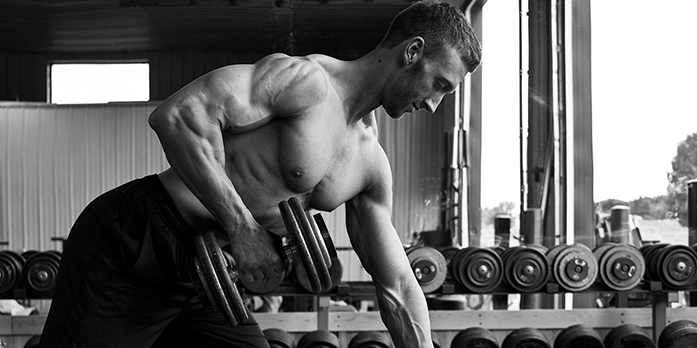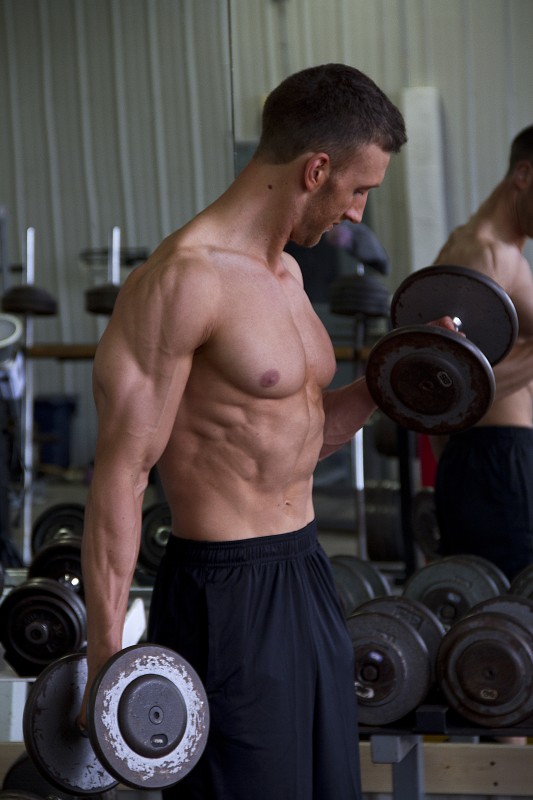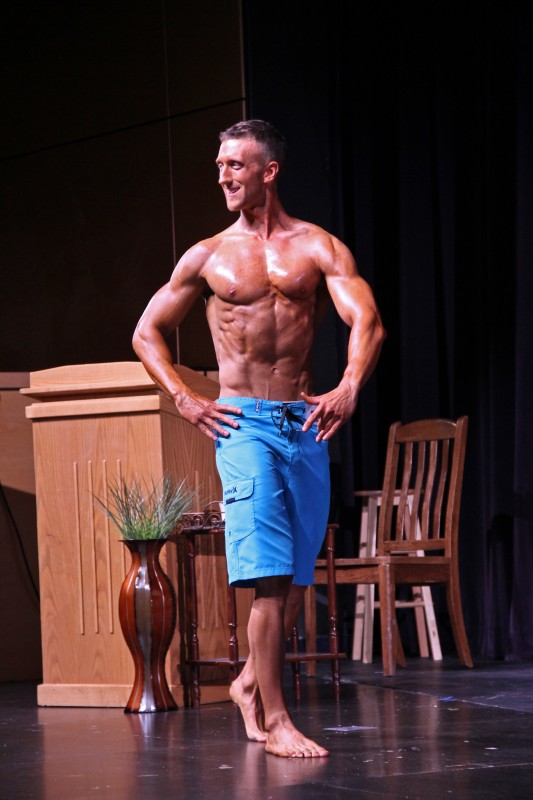
Have you ever thought about competing in a physique show, but the thought of dropping carbohydrates extremely low and doing cardio multiple times per day scares you to death?
Competing in a show can seem overwhelming, and you may have no idea what to expect. If you’ve ever considered it, I’m going to share five things I learned from training and competing in my first show that may help you get over the fears that are holding you back.
1. You need a good coach.
As a personal trainer myself, I thought I knew exactly what I was doing. I coach others on changing their bodies — of course I can transform my own! A couple of months into my prep, I realized my body wasn’t changing, so I finally sucked it up and hired a contest prep coach.
When I sent my coach my first progress photo, I couldn’t believe how bad I looked. I realized how much I needed help. Sometimes, it’s a lot easier to coach others than it is to coach yourself. It became apparent really quickly I was focusing on many of wrong things with my diet.
For example, I was focusing far too much on pre- and post-workout nutrition. I tried to hit the exact recommendations for protein and carbohydrate around my workout, but I never really saw great results. That’s because I wasn’t focusing enough on my calorie and macronutrient intake for the entire day.
My workout nutrition meant very little if I didn’t consistently hit my macros every day. I was also routinely changing too many variables with my diet. With a coach, I no longer needed to concern myself with making adjustments to my nutrition, because he made them for me.
MORE: How Bodybuilding Changed My Life
Perhaps the biggest benefit of having a coach was the accountability he gave me. Every single week, I sent my weight and progress photos to him. I knew if I didn’t do what he said, I was going to be embarrassed by my results. A good coach can also give you honest feedback about your rate of progress.
About 10 weeks out, I felt there was no way I was going to be ready in time, but he told me to keep trusting in the process. A few weeks before the show, I decided to shave some body hair and start tanning. And wow, did I notice a difference! The tanning and reduction in body hair really brought out the definition in my body. At the moment, I realized my trust in my coach paid off big time.
Before you hire someone, though, do your research. Find out if that individual has good testimonials and won't just give you a cookie-cutter program to follow. Obviously, paying a coach can be a large expense, but knowing you’re paying money to someone will make you do the work. It’s very hard to follow through on free advice because you’ve got nothing to lose. I knew I was paying a good amount of money to my coach each month, so I didn’t want to feel like I was wasting money.
2. You need an off-season before you prep.
I began working with my coach about five months before the competition. When I started with him, we immediately started cutting, because my body-fat percentage was too high to start bulking. I was a shade under 190 pounds, but I needed to reduce my body fat to improve insulin sensitivity, which helps nutrients get stored in the muscle or liver rather than as body fat (Larson-Meyer et al., 2006). It wasn’t until I got down to about 175 pounds and 2,500 calories a few weeks later that I started adding food to my diet. I spent four weeks bulking, but I didn’t gain a single pound, because my metabolic rate was increasing.
By the time I got my body fat levels down to the point I could start bulking, I didn’t have enough time to put on any appreciable muscle for the show. It was at this point that I realized I should have hired a coach a long time ago. On the day of my show, I weighed in at 158.8 pounds, so I had lost around 30 pounds in five months.
As someone who had always focused on gaining weight to build muscle, this was a hard pill to swallow. Because I was so lean, though, I had the appearance I was bigger than my body weight suggested. In fact, a couple of people told me I looked 15 to 20 pounds heavier. I’m planning to wait at least 18 to 24 months to compete in my next show so I can add enough weight to be at least 20 pounds heavier on stage.
For me, losing weight is easy, but building muscle is a painstakingly slow process, especially doing it the right way.
3. Your diet isn’t over once the show is over.
Bodybuilders obviously look forward to the show itself, but what’s even more fun than competing? The meal after the show! Because your diet is so restrictive the weeks and months leading up to the contest, you can’t wait to get your hands on all the foods you couldn’t have.
After my show, I was able to have some pizza, breadsticks, and cheesecake, but I didn’t have an “all-out” binge because I had a photoshoot the following morning. Once my photoshoot was over, I feasted like it was the last meal I would ever have!
You may have heard stories of bodybuilders and physique athletes gaining lots of weight and having uncontrollable urges following a diet. That’s because an extreme diet can place you in a massive caloric deficit if you need to burn off stubborn fat to get lean enough for competition. Male bodybuilders often get as low as five to eight percent body fat, while women get between 15 and 18 percent.
The New York Times released a study about contestants on NBC’s reality TV show “The Biggest Loser” regaining weight at an alarming rate after the show ended. Researchers followed contestants from the 2009 season for six years following the show and found 13 of the 14 studied regained weight and four contestants were heavier than before the show (Kolata, 2016).
To make matters worse, nearly all of the contestants had slower metabolisms than they did six years prior and burned fewer calories than expected at rest. In fact, the show’s winner re-gained more than 100 pounds and now burns 458 fewer calories than would be expected for a man his size. While the majority of bodybuilders aren’t losing anywhere near this much weight for their shows, they must be aware of the dangers of “falling off the wagon” after a competition.
For most people, very low levels of body fat aren’t sustainable, as your body likes to be at a certain level of body fat for survival. When you’re in a caloric deficit, your body will send hunger signals to eat more food. Enjoy eating some fun foods the 24 hours after a show, but consuming junk food several days following a show can potentially have serious health implications.
A study at Virginia Tech found evidence that just five days of an isocaloric, high-fat diet in healthy, young males possibly led to insulin resistance (Anderson et al., 2015). For this reason, reverse dieting is imperative. You want to gradually re-introduce calories to your body to improve your metabolic health.
I was taking in a shade above 2,000 calories per day at the end of my prep. The Monday after my show, after having a day of eating mostly what I wanted, I added a small number of calories back into my diet. Sure, I wanted to get back up to 3,000 or 3,500, but I knew if I did that, I would gain a good amount of body fat pretty quickly. After a diet, you don’t need to be as precise with your measurements and intake, but you shouldn’t eliminate a system of tracking completely.
4. The work you put in won’t matter if you can’t show it off.
A few weeks before I competed, I decided to attend a bodybuilding show to see firsthand how a competition was run. After watching the show for just a short while, I realized the massive importance of stage presence. The confidence of the competitor correlated very well with his or her placement. You could really tell who had been practicing their posing and who hadn’t.
In “The New Encyclopedia of Modern Bodybuilding,” Arnold Schwarzenegger tells a story that highlights the importance of posing (Schwarzenegger and Dobbins, 1999). A well-known bodybuilder came up to him backstage at the Arnold Classic one time and asked him to evaluate his posing. Arnold told him “If I had your physique, I’d win the show.” The bodybuilder started telling everyone Arnold told him he was going to win, but he ended up not doing nearly as well in the competition as he would have if he were a better poser.
What Arnold actually meant was that if he personally had the man’s physique, he would win the show because of his superior posing skills. You can have the best body at the competition, but if you can’t show that to the judges, you’re not going to do very well. If you don’t already know how to pose, you better learn!
A month into my prep, I started getting lessons from a posing coach. I was competing in men’s physique, so I needed to learn quarter turns: a front pose, back pose and two side poses. I thought learning four poses was hard, so I can’t even imagine learning all the poses bodybuilders must know!
At first, the poses felt extremely awkward, but after a while, I started getting the hang of them. While my posing at the competition was far from perfect, I could tell my work with a coach gave me a leg up on my competition. It was a small show, but I ended up finishing second out of four in my division. The only person who finished ahead of me also had the same posing coach — go figure!
In fact, others who used my same posing coach had tremendous success in the competition, too. The two finalists in the women’s bikini division both worked with her. Remember, training and dieting is only part of the equation. Stage presence can make or break you.
If you haven’t attended a show before, I highly recommend finding one in your area, even if it’s sponsored by a different governing body than the show you’re targeting.
5. You need to decide if the outcome is worth the sacrifices.
For years, I’ve been training hard in the gym, following a meal plan, and at least somewhat tracking my caloric intake. So for me, transitioning to contest prep wasn’t a major lifestyle change. I absolutely love working out and eating to support lean muscle growth, but if you’re not accustomed to training consistently every week and counting macronutrients every day, you may want to think twice about competing.
I also don’t have too much trouble saying no to junk food, I don’t drink alcohol and I don’t have a booming social life. If you love socializing with your friends around food or drink, eating out frequently, or traveling often, you may not enjoy dieting for a bodybuilding show.
Competing can be very rewarding, but you must understand that sacrifices need to be made for both you and your family. If you have a significant other or kids, you need to understand they’ll be affected as well. My wife and I had to decline some social invitations because I couldn’t stick to my diet if we attended a certain event.
Also, if you have an eating disorder or are afraid of developing an eating disorder, you should shy away from competing. According to the Renfrew Center Foundation for Eating Disorders, about 42 percent of female athletes who compete in aesthetic sports demonstrate eating disordered behaviors (The Renfrew Center Foundation for Eating Disorders, 2003). Males are affected too, and many suffer from what’s been termed “muscle dysmorphia,” which is a “pathological preoccupation with the perceived smallness or weakness of one’s body and musculature, often leading to excessive exercise (such as bodybuilding), steroid abuse, or eating disorders (Merriam-Webster).”
According to a study, about 25 percent of normal weight males think they’re underweight, 90 percent of teenage boys workout with the intention of bulking up, and 68 percent of college-age men believe they have too little muscle (Research on Males and Eating Disorders).
I had been focusing on bulking up to add muscle mass for years, so the thought of losing weight was scary for me. When I began dropping weight at the start of my prep, I got nervous. I feared I would lose too much weight and end up looking too small on stage. It was also challenging for me because so many people commented on how skinny I looked as a result of my diet. Thankfully, I was able to keep a positive mindset.
RELATED: How to Know If You Are Ready for Your First Powerlifting Meet
You need to understand the consequences of being in a caloric deficit for a sustained period of time, especially if you’re used to eating at either maintenance or in a surplus. You’re going to feel hungrier more often than ever, but no one is going to feel sorry for you because if you really wanted to, you could grab food from the refrigerator to satisfy your cravings.
If you lived in a third-world country, you likely wouldn’t have that luxury. Also, unless you’re a beginning lifter, your strength is going to decrease when you drop a good amount of body weight. For me, I experienced noticeable decreases in performance on compound lifts like the squat, bench press, and deadlift, but not as much on isolation exercises like bicep curls or triceps extensions.
Know that no one else is making you train and diet like this. All of the suffering you put yourself through is a result of your choices. With that said, it can be extremely rewarding to see the prep through to the end in order to have a body 99.9 percent of the population is unwilling to put in the work to attain. If you stick to the plan, you’ll see massive changes in how you look every week, and you’ll have pictures to show off once it’s all said and done.
While there were certain aspects of my own prep I didn’t particularly enjoy, I would absolutely step on stage again. It’s surreal to see the changes you can make to your body from putting in a consistent effort. If you enjoy the process and not just the outcome, and you’re willing to make sacrifices for at least a few months, you may consider doing a show. If these things don’t sound interesting to you, I wouldn’t recommend physique sports to you.
References
- Anderson, AS, KR Haynie, RP McMillan, KL Osterberg, NE Boutagy, MI Frisard, BM Davy, KP Davy, and MW Hulver. "Result Filters." National Center for Biotechnology Information. U.S. National Library of Medicine, Apr. 2015. Web. 13 Oct. 2016.
- Kolata, Gina. "After ‘The Biggest Loser,’ Their Bodies Fought to Regain Weight." The New York Times. N.p., 2 May 2016. Web.
- Larson-Meyer, D. Enette, Leonie K. Heilbronn, Leanne M. Redman, Bradley R. Newcomer, Madlyn I. Frisard, Steve Anton, Steven R. Smith, Anthony Alfonso Maplstat, and Eric Ravussin. "Effect of Calorie Restriction With or Without Exercise on Insulin Sensitivity, β-Cell Function, Fat Cell Size, and Ectopic Lipid in Overweight Subjects." National Institutes of Health (2006): n. pag. Print.
- Merriam-Webster. Merriam-Webster, n.d. Web. 13 Oct. 2016.
- "Research on Males and Eating Disorders." National Eating Disorders Association. N.p., n.d. Web. 13 Oct. 2016.
- Schwarzenegger, Arnold, and Bill Dobbins. “The New Encyclopedia of Modern Bodybuilding.” New York, NY; Fireside, 1999. Print.
- The Renfrew Center Foundation for Eating Disorders, Eating Disorders 101 Guide: A Summary of Issues, Statistics and Resources, 2003.
Images courtesy of Corso Photographic
Luke Briggs is a strength coach and former full-time print journalist who blends his knowledge of fitness and writing skills to bring you a clear-cut, sustainable approach to building your goal body. A genetically average lifter who’s dabbled in both bodybuilding and powerlifting, Luke developed Luke Briggs Fitness to give you the best possible resource for building lean muscle and getting stronger.











